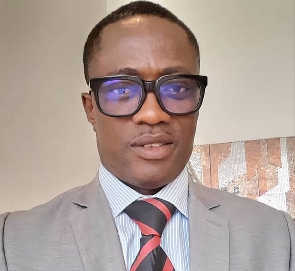A security analyst and Executive Director of the Africa Center for Human Security and Emergency Management (ACHSEM), Bill Godson Ocloo has said that centralizing information flow in policing is not the best for Ghana.
Ocloo was speaking in an interview following claims by the Inspector General of Police (IGP), Dr. George Akufo Dampare on centralizing information flow in the police service as a way of checking distortions and preventing leakages in the service.
Former Director General Operations of the Ghana Police Service, Commissioner of Police (COP), George Alex Mensah alleged before the Parliamentary Committee probing the leaked tape in which plans were being discussed to oust the IGP from office that the IGP was centralizing information flow in the service in his quest to gag the police service and to prevent senior police officers including commanders from expressing dissenting views or interacting with the media on security issues.
The IGP in a rebuttal on the same platform indicated that centralizing information flow in the service was by international best practices.
However, Ocloo has strongly opposed the claim by the IGP saying, it was inimical and adverse to centralize information flow in the police service.
He noted that he had not seen anywhere in the world where information flow in the police service was centralized, adding that the bureaucratic nature of the centralization system was defeating the idea of community policing in the country.
“How can it be a case that an incident will happen in a local community and the commander in the area cannot speak to the issues, it has to come to Accra before it can be disseminated,” Mr. Ocloo quizzed.
He said the police service was a national institution and had regional, divisional, district, and station commands, which meant that the service had already decentralized its operations.
"All these commands should have the power to communicate to the media and receive feedback to evaluate their communication to the public.
"If the IGP is talking about centralized communication, what that means is that you must verify the information through a laid down structure so that it doesn’t come back to haunt the service. That doesn’t mean that every communication should be done at the national level. This can’t be possible. Communication is dynamic".
"All the commands should be able to communicate to the community they serve without any hindrance placed on their way," the security analyst indicated.
Ocloo pointed out that in Ghana, as in many countries, the management of information within law enforcement agencies was a complex matter that required careful consideration of various factors.
"The question of centralizing information flow needs to be examined within the specific context of our country and its unique challenges", he added.
He further stated that practices within law enforcement can vary based on jurisdiction, legal frameworks, and operational needs, adding that the police service had the responsibility to ensure the safety and security of citizens.
Ocloo observed that the centralization of information flow can have advantages in terms of improving coordination and resource allocation, which can enhance the ability of the service to respond effectively to crimes and emergencies, and also help in the fight against transnational crime and terrorism.
However, the security analyst contended that concerns related to transparency, accountability, and the protection of individual rights and privacy must be considered when striking the balance between centralization and decentralized oversight as that was a challenge law enforcement agencies faced worldwide.
Ocloo said the decision on whether or not to centralize information flow within the police service should be guided by a thorough assessment of the country's unique needs, legal requirements, and the expectations of the citizenry.
"There should be an avenue for constructive dialogue and collaboration with all stakeholders, including the media, to ensure that our policing practices are in the nation's best interest while respecting the rights and values that define us as a society".
"Policing practices can vary significantly from one jurisdiction to another. What is considered standard practice in one country or region may not be the same in another".
"The level of trust the public has in law enforcement agencies is crucial. A perception of excessive centralization and lack of transparency can erode public trust. Conversely, a perception of inefficiency due to decentralized information flow can also undermine trust. Balancing these concerns is a significant challenge for police agencies," he outlined.
The ACHSEM Executive Director said the centralization or decentralization of information flow within the Police Service can have significant implications for responding to and managing crises effectively when viewed from a crisis information management perspective.
"In times of crisis, the effective management of information becomes paramount. The Police Service recognizes the critical role that information plays in our ability to respond swiftly and efficiently to emergencies and crises that affect our communities," Ocloo said.
He indicated that centralizing information flow can offer some advantages in crisis management.
"It can streamline the dissemination of critical information, enabling faster decision-making and resource allocation. It can also facilitate coordination among different units and agencies involved in crisis response, which is essential for a unified and effective response"
"However, it is equally important to maintain a decentralized capacity for information gathering and situational awareness at the local level"
"Local officers often have the best understanding of their communities and can provide valuable on-the-ground information during a crisis"
"This decentralized capacity can complement centralized efforts and enhance the overall effectiveness of crisis response," Ocloo contends.
Regional News of Tuesday, 19 September 2023
Source: Leo Nelson, Contributor













